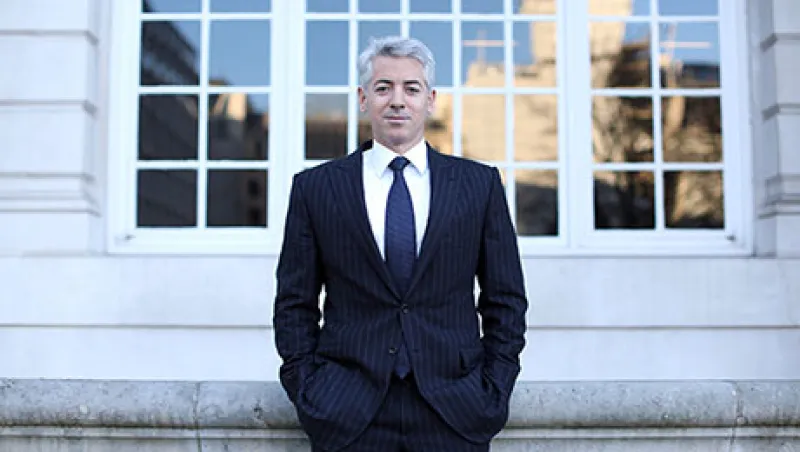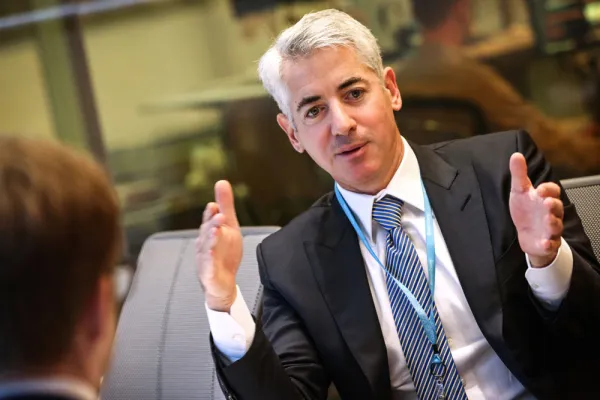Pershing Square Capital Management CEO Bill Ackman’s tortuous four-year battle against Herbalife took a new turn on Tuesday, when the Federal Trade Commission said it was mailing checks to 350,000 Herbalife victims in the U.S. — boosting the hedge fund manager’s claim that the multilevel marketing company has defrauded millions of people around the world.
The checks are the result of a July 2016 settlement with the FTC that required Herbalife to pay $200 million and fundamentally restructure its business, the FTC said in a statement. But the settlement, although one of the biggest in the FTC’s history, still wasn’t big enough to make whole the people who lost money running Herbalife businesses, the FTC acknowledged. They will only be getting restitution of 10 to 20 percent of what they paid for Herbalife’s protein shakes and other nutritional products, victim advocates and attorneys who helped the victims file complaints with the FTC told Institutional Investor.
Ackman, who declined to comment on the news, hasn’t been made whole either. His Herbalife short remains a big position for his Pershing Square hedge funds, representing about 9 percent of his $11.6 billion firm at year-end. And whereas Herbalife shares fell 9.4 percent last year, representing a yearly gain for Ackman, he’s still in the red since he first shorted the company in May 2012.
But the battle has been moving in Ackman’s favor. Following the FTC’s two-year investigation into Herbalife’s business practices, the regulator reached a settlement with Herbalife over charges that it had deceived those who signed up to be Herbalife distributors. In addition to the $200 million payment, Herbalife will be subject to an independent federal monitor for seven years to make sure it follows stringent rules the FTC instituted as part of the deal. Those rules are designed to make sure Herbalife starts “operating legitimately,” as FTC chair Edith Ramirez put it at the time.
More bad news for Herbalife is coming as well: on March 2017, a documentary about Ackman’s battle, Betting on Zero, will hit the theaters, according to sources familiar with the release plans. (It premiered at the Tribeca Film Festival in April 2016.) The documentary features Ackman and Hispanic activist Julie Contreras (who brought 45 victims to the FTC) and shines a harsh light on the company’s practices.
Since the settlement, Herbalife shares have fallen more than 25 percent, as the bad news kept coming. Last fall CEO Michael Johnson announced he would leave his post, and an ill-fated attempt by Herbalife’s largest shareholder, Carl Icahn, to sell his stake has also weighed on the stock, according to investors. So has the dollar’s strength against the Mexican peso following the election of Donald Trump as president of the U.S., as Mexico represents one of Herbalife’s biggest markets.
Herbalife’s drop last year helped trim the losses in Pershing Square International, Ackman’s offshore fund, to an estimated 9 percent by December 27. His public fund, Pershing Square Holdings, was down 13.5 percent at year-end. (At its low point last year, on March 15, Pershing Square Holdings was down 26 percent, largely because of his disastrous bet on struggling drugmaker Valeant Pharmaceuticals International.)
Herbalife closed Tuesday at $49.54 — up about 1 percent for the year and slightly above Ackman’s breakeven of about $48 on his short position. However, he’s already taken losses on put options he bought, starting in mid-2013, to restructure the short when it soared after Icahn took a big stake in the company. Icahn, who now has five Herbalife board seats, owns more than 24 percent of Herbalife, with breakeven of about $41.91.
One wild card is the future posture of the FTC in a Trump administration, now that Icahn has been named a special adviser to the president on regulatory issues. Multilevel marketing critics are worried that the FTC, which has had a hands-off attitude to MLMs in prior Republican administrations, will revert to that view.
Meanwhile, the 350,000 people receiving checks for their Herbalife losses represent only a small portion of the people who signed up to be Herbalife distributors between 2009 and 2015, the period the settlement covered. Doug Brooks, an attorney who represented some of the victims, estimates that only 25 percent of the Herbalife distributors during that time frame are receiving checks — primarily individuals who spent $4,000 to $5,000 to become “supervisors,” which allowed them to recruit others into the business, as that’s where most of the big losses occur. He estimates their total losses come to about $1.5 billion during the period covered by the settlement.
Not all of those who filed complaints with the FTC are receiving checks either. Of the 45 victims that Contreras took to the FTC, only 15 are getting a check. Whereas they ended up losing money, they also participated, although unwittingly, in the alleged fraud by recruiting others and have been excluded as a result. “It’s as if they are being revictimized,” Contreras told Institutional Investor.
The FTC doesn’t see it that way. “We are pleased to announce that hundreds of thousands of hard-working consumers victimized by Herbalife’s deceptive earnings claims will receive money back,” said Jessica Rich, director of the agency’s Bureau of Consumer Protection, in a statement. “Along with changes the company will make to its business structure, this is a win for consumers.”







